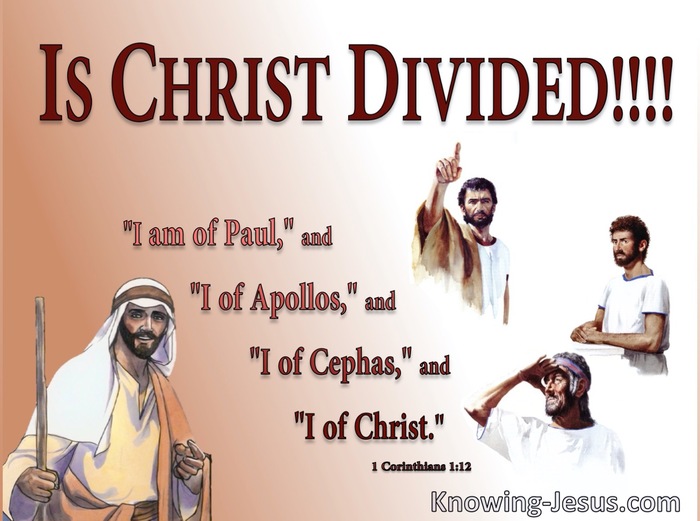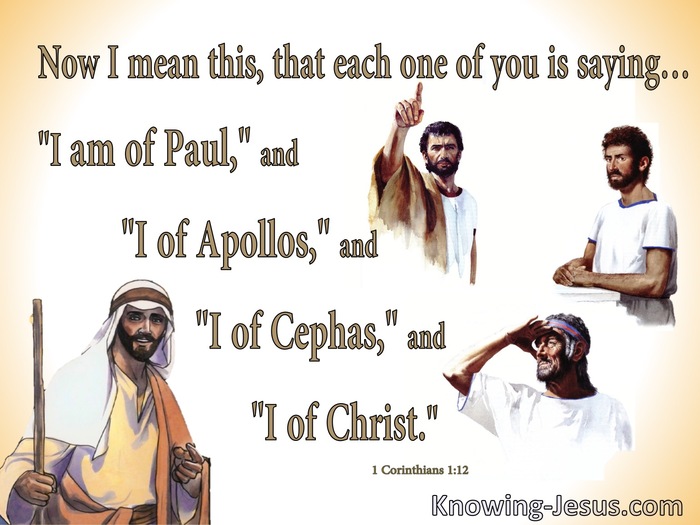Parallel Verses
An Understandable Version
Now this is what I mean: Each of you is saying, "I am a follower of Paul," and another "I am a follower of Apollos," and another "I am a follower of Cephas [i.e., Peter]," and another "I am a follower of Christ."
New American Standard Bible
Now I mean this, that
King James Version
Now this I say, that every one of you saith, I am of Paul; and I of Apollos; and I of Cephas; and I of Christ.
Holman Bible
What I am saying is this: Each of you says, “I’m with Paul,” or “I’m with Apollos,”
International Standard Version
This is what I mean: Each of you is saying, "I belong to Paul," or "I belong to Apollos," or "I belong to Cephas," or "I belong to the Messiah."
A Conservative Version
Now I say this. That each of you actually say, I am of Paul, and I of Apollos, and I of Cephas, and I of Christ.
American Standard Version
Now this I mean, that each one of you saith, I am of Paul; and I of Apollos: and I of Cephas; and I of Christ.
Amplified
Now I mean this, that each one of you says, “I am [a disciple] of Paul,” or “I am [a disciple] of Apollos,” or “I am [a disciple] of Cephas (Peter),” or “I am [a disciple] of Christ.”
Anderson New Testament
I mean this: that each one of you says, I am of Paul, and I of Apollos, and I of Cephas, and I of Christ.
Bible in Basic English
That is, that some of you say, I am of Paul; some say, I am of Apollos; some say, I am of Cephas; and some say, I am Christ's.
Common New Testament
What I mean is this, that each one of you says, "I am of Paul," and "I of Apollos," and "I of Cephas," and "I of Christ."
Daniel Mace New Testament
I mean that one or other of you cries out "I am of Paul, and I of Apollos, and I of Cephas,
Darby Translation
But I speak of this, that each of you says, I am of Paul, and I of Apollos, and I of Cephas, and I of Christ.
Godbey New Testament
And I say this, that each one says, I indeed am of Paul; and I of Apollos; and I of Cephas; and I of Christ.
Goodspeed New Testament
What I mean is this, that one of you says, "I am a follower of Paul," another, "And I, of Apollos," another, "And I, of Cephas," and another, "And I, of Christ!"
John Wesley New Testament
Now this I say, every one of you saith, I am of Paul, and I of Apollos, and I of Cephas, and I of Christ.
Julia Smith Translation
And this I say, that each of you says, I truly am of Paul; and I of Apollos; and I of Cephas; and I of Christ.
King James 2000
Now this I say, that every one of you says, I am of Paul; and I of Apollos; and I of Cephas; and I of Christ.
Lexham Expanded Bible
But I say this, that each of you is saying, "I am with Paul," and "I [am] with Apollos," and "I [am] with Cephas," and "I [am] with Christ."
Modern King James verseion
But I say this, that every one of you says, I am of Paul, and I of Apollos, and I of Cephas, and I of Christ.
Modern Spelling Tyndale-Coverdale
And this is it that I mean: how that commonly among you, one sayeth, "I hold of Paul"; Another, "I hold of Apollos"; the third, "I hold of Cephas"; and the fourth that, "I hold of Christ."
Moffatt New Testament
By 'quarrelling' I mean that each of you has his party-cry, "I belong to Paul," "And I to Apollos," "And I to Cephas," "And I to Christ."
Montgomery New Testament
I mean by this that one of you says, "I am a follower of Paul"; another, "I of Apollos"; another, "I of Cephas"; another, "I of Christ."
NET Bible
Now I mean this, that each of you is saying, "I am with Paul," or "I am with Apollos," or "I am with Cephas," or "I am with Christ."
New Heart English Bible
Now I mean this, that each one of you says, "I follow Paul," "I follow Apollos," "I follow Cephas," and, "I follow Christ."
Noyes New Testament
What I mean is this, that each of you saith, I am of Paul; and I of Apollos; and I of Cephas; and I of Christ.
Sawyer New Testament
I mean this; that each one of you says I indeed am of Paul, and I of Apollos, and I of Cephas, and I of Christ.
The Emphasized Bible
Now I mean this, - that, each one of you, is saying - I, indeed, am of Paul, but, I, of Apollos, but, I, of Cephas, but, I, of Christ:
Thomas Haweis New Testament
Now this I observe, that one and another of you saith, I am indeed of Paul; but I of Apollos; but I of Cephas; but I am of Christ.
Twentieth Century New Testament
I mean this, that every one of you says either 'I follow Paul,' or 'I Apollos,' or 'I Kephas,' or 'I Christ.'
Webster
Now this I say, that every one of you saith, I am of Paul; and I of Apollos; and I of Cephas; and I of Christ.
Weymouth New Testament
What I mean is that each of you is a partisan. One man says "I belong to Paul;" another "I belong to Apollos;" a third "I belong to Peter;" a fourth "I belong to Christ."
Williams New Testament
I mean this, that one of you says, "I belong to Paul's party," another, "And I belong to Apollos' party," another, "And I belong to Cephas' party," another, "And I belong to Christ's party."
World English Bible
Now I mean this, that each one of you says, "I follow Paul," "I follow Apollos," "I follow Cephas," and, "I follow Christ."
Worrell New Testament
Now I mean this: that each one of you is saying, "I am of Paul;" and "I of Apollos;" and "I of Cephas:" and "I of Christ!"
Worsley New Testament
I mean, that each of you saith, as if of different parties, I am of Paul, and I of Apollos, I of Cephas, and I of Christ.
Youngs Literal Translation
and I say this, that each one of you saith, 'I, indeed, am of Paul' -- 'and I of Apollos,' -- 'and I of Cephas,' -- 'and I of Christ.'
Themes
Apollos » General references to
Apollos » An eloquent, Christian convert at corinth
Corinth » The congregation of » Schism in
Disciples/apostles » What jesus Christ sent his disciples to do
Divisions » Condemned in the church
Topics
Interlinear
De
Touto
Ego
ἐγώ
Ego
ἐγώ
Ego
ἐγώ
Ego
I, my, me, not tr
I, my, me, not tr
I, my, me, not tr
Usage: 174
Usage: 174
Usage: 174
De
δέ
De
δέ
De
but, and, now, then, also, yet, yea, so, moreover, nevertheless, for, even, , not tr
but, and, now, then, also, yet, yea, so, moreover, nevertheless, for, even, , not tr
Usage: 2184
Usage: 2184
References
Hastings
Morish
Watsons
Word Count of 37 Translations in 1 Corinthians 1:12
Prayers for 1 Corinthians 1:12
Verse Info
Context Readings
Divisions In The Church At Corinth
11 For it has been reported to me about you, my brothers, by some of Chloe's family, that there is quarreling [going on] among you. 12 Now this is what I mean: Each of you is saying, "I am a follower of Paul," and another "I am a follower of Apollos," and another "I am a follower of Cephas [i.e., Peter]," and another "I am a follower of Christ." 13 Has Christ been divided? Was Paul crucified for you? Or were you immersed into the name of Paul?
Cross References
John 1:42
So, Andrew brought Simon Peter to Jesus. [And when] Jesus saw him, He said [to him], "You are Simon, the son of John [Note: Peter's father is called Jonah in Matt. 16:17]; you will be called Cephas (which means Peter [i.e., "a stone." See Matt. 16:18])."
1 Corinthians 9:5
Do we not have the right to take a believing [i.e., a Christian] wife with us [on our preaching tours], just like the rest of the apostles, and the Lord's brothers do [i.e., James, Joseph, Judas and Simon. Mark 6:3], and Cephas [i.e., Peter]?
1 Corinthians 15:5
and He appeared to Cephas [i.e., Peter. See Luke 24:34], and then to the twelve apostles. [See Luke 24:33].
Matthew 23:9-10
And do not call any man on earth 'father,' [i.e., in a religious sense], for the [only] one who is your Father is in heaven.
Acts 18:24-1
Now a certain Jew named Apollos, a native of Alexandria [Egypt] and an effective speaker, who was well-grounded in the [Old Testament] Scriptures, came to Ephesus.
1 Corinthians 3:4-6
For when one of you says, "I am a follower of Paul," and another says, "I am a follower of Apollos," are you not [acting like worldly] people?
1 Corinthians 3:21-23
So, no one should boast about [the knowledge or position of] people. For all things belong to you,
1 Corinthians 4:6
Now I have applied these things, brothers, to myself and to Apollos as an illustration for your benefit, so that you might learn to "follow the written message." [Note: This is thought to have been a common way of referring, in that day, to the importance of adhering to Old Testament Scripture]. So, none of you should be more proud of one [leader] than of another.
1 Corinthians 7:29
But I say this, brothers; there is not much time left [i.e., before the crisis arrives in full fury. See verse 26]. From now on those men who are married should live as though they were single.
1 Corinthians 15:50
Now this is what I am saying, brothers; flesh and blood [i.e., physical bodies] cannot possess the kingdom of God [i.e., the heavenly realm]; neither can [bodies that] decay possess [a place] which does not decay.
1 Corinthians 16:12
Now concerning our brother Apollos: I strongly urged him to go to you with the other brothers, but he was not at all willing to do so at this time. But he will go when he has the opportunity.
2 Corinthians 9:6
But [remember] this: The person who plants only a few seeds will harvest a meager crop. And the one who plants many seeds [Note: The Greek says, "plants with blessings"] will harvest a bumper crop.
Galatians 2:9
Also, when they perceived that this [special] favor [of preaching to Gentiles] was granted to me, James, Cephas [i.e., Peter] and John, the highly regarded pillars [i.e., leaders of the church] extended to me and Barnabas their right hands [signifying an agreement] to share [in the preaching of the Gospel], with us going to the Gentiles and they going to the circumcised ones [i.e., Jews].
Galatians 3:17
Here is what I am saying: The Agreement originally made by God [with Abraham], with its attending promises, was not canceled when the law of Moses was given some four hundred and thirty years later.



